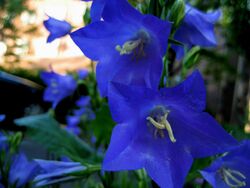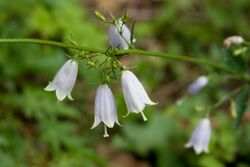Biology:Adenophora
| Ladybells | |
|---|---|

| |
| Adenophora sp. | |
| Scientific classification | |
| Kingdom: | Plantae |
| Clade: | Tracheophytes |
| Clade: | Angiosperms |
| Clade: | Eudicots |
| Clade: | Asterids |
| Order: | Asterales |
| Family: | Campanulaceae |
| Subfamily: | Campanuloideae |
| Genus: | Adenophora Fisch. |
| Synonyms[1] | |
|
Floerkea Spreng. 1818, illegitimate homonym, not Willd. 1801 nor Raf. 1808 | |
Adenophora is a genus of flowering plants in the family Campanulaceae, the bellflowers. Plants of this genus are known commonly as ladybells.[2] Most are native to eastern Asia, with a few in Europe. Many are endemic to either China or Siberia.[1][3]
Description
These plants are perennial herbs, often with thick, fleshy roots. The stem usually grows erect from a caudex. There are usually several basal leaves borne on long petioles. The leaves on the stem are alternately arranged in most species. Flowers are solitary or borne in cymes. The corolla of the flower is bell-shaped, funnel-shaped, or tubular, with five lobes.[3] The corollas of most species are blue.[2] There is a characteristic nectar disc at the base of the stamens.[3]
Diversity
There are about 62 species in the genus.[3]


- Adenophora amurica – Heilongjiang
- Adenophora brevidiscifera – Sichuan
- Adenophora capillaris – Chongqing, Guizhou, Hebei, Henan, Hubei, Inner Mongolia, Shaanxi, Shandong, Shanxi, Sichuan, Yunnan
- Adenophora changaica – Mongolia
- Adenophora coelestis – Sichuan, Yunnan
- Adenophora contracta – Liaoning, Inner Mongolia
- Adenophora cordifolia – Henan
- Adenophora divaricata – spreading-branch ladybell[5] – Honshu, Shikoku, Korea, Amur, Primorye, Khabarovsk, Hebei, Heilongjiang, Jilin, Liaoning, Shandong, Shanxi
- Adenophora elata – Hebei, Inner Mongolia, Shanxi
- Adenophora erecta[6] – erect ladybell[5] – Ulleungdo Island
- Adenophora fusifolia – South Korea
- Adenophora gmelinii – narrow-leaf ladybell[5] – Buryatiya, Chita, Amur, Primorye, Mongolia, Korea, Hebei, Heilongjiang, Jilin, Liaoning, Inner Mongolia, Shanxi
- Adenophora golubinzevaeana – Krasnoyarsk
- Adenophora grandiflora – big-flower ladybell[5] – Korea
- Adenophora hatsushimae – Kyushu
- Adenophora himalayana – Kazakhstan, Kyrgyzstan, Tajikistan, Tibet, Nepal, northern India, Xinjiang, Gansu, Shaanxi, Sichuan
- Adenophora hubeiensis – Hubei
- Adenophora × izuensis – Honshu
- Adenophora jacutica – Yakutiya
- Adenophora jasionifolia – Tibet, Sichuan, Yunnan
- Adenophora kayasanensis – Gayasan ladybell[5] – Korea
- Adenophora khasiana (syn. A. bulleyana) – Assam, Bhutan, Myanmar, Tibet, Sichuan, Yunnan
- Adenophora koreana – Korean ladybell[5] – Korea
- Adenophora lamarckii – Lamark's ladybell[5] – Irkutsk, Altai, Kazakhstan, Xinjiang, Mongolia, Korea
- Adenophora liliifolia – lily-leaf ladybell[5] central and eastern Europe (Germany, Switzerland, Italy, etc.) east to Xinjiang
- Adenophora liliifolioides – Gansu, Shaanxi, Sichuan, Tibet
- Adenophora lobophylla – Sichuan
- Adenophora longipedicellata – Chongqing, Guizhou, W Hubei, Sichuan
- Adenophora maximowicziana – Shikoku
- Adenophora micrantha – Inner Mongolia
- Adenophora morrisonensis – Taiwan
- Adenophora nikoensis – Honshu
- Adenophora ningxianica[7] – Gansu, Inner Mongolia, Ningxia
- Adenophora palustris – marsh ladybell[5] – Jilin, Korea, Honshu
- Adenophora pereskiifolia – Manchurian ladybell[5] – Mongolia, Japan, Korea, Heilongjiang, Jilin, Amur, Kuril Islands, Primorye, Khabarovsk, Chita, Buryatiya
- Adenophora petiolata – Anhui, Chongqing, Fujian, Gansu, Guangdong, Guangxi, Guizhou, Hebei, Henan, Hubei, Hunan, Jiangsu, Jiangxi, Shaanxi, Shanxi, Sichuan, Zhejiang
- Adenophora pinifolia – Liaoning
- Adenophora polyantha – many-flower ladybell[5] – Korea, Anhui, Gansu, Hebei, Henan, Jiangsu, Liaoning, Inner Mongolia, Ningxia, Shaanxi, Shandong, Shanxi
- Adenophora potaninii – Gansu, Hebei, Henan, Liaoning, Inner Mongolia, Ningxia, Qinghai, Shaanxi, Shanxi, Sichuan
- Adenophora probatovae – Primorye
- Adenophora racemosa – racemose ladybell[5] – Korea
- Adenophora remotidens – Incheon ladybell[5] – Korea
- Adenophora remotiflora – scattered ladybell[5] – Primorye, Japan, Korea, Manchuria
- Adenophora rupestris – Irkutsk
- Adenophora rupincola – Hubei, Hunan, Jiangxi, Sichuan
- Adenophora sajanensis – Krasnoyarsk
- Adenophora sinensis – Anhui, Fujian, Guangdong, Hunan, Jiangxi
- Adenophora stenanthina – Mongolia, Gansu, Hebei, Jilin, Inner Mongolia, Ningxia, Qinghai, Shaanxi, Shanxi, Altai, Amur, Irkutsk, Chita, Buryatiya, Tuva
- Adenophora stenophylla – Mongolia, Inner Mongolia, Manchuria
- Adenophora stricta – upright ladybell[5] – Korea, Japan, Anhui, Chongqing, Fujian, Gansu, Guangxi, Guizhou, Henan, Hubei, Hunan, Jiangsu, Jiangxi, Shaanxi, Sichuan, Yunnan, Zhejiang
- Adenophora sublata – Primorye, Khabarovsk
- Adenophora takedae – Honshu
- Adenophora taquetii – Jejudo ladybell[5] – Korea
- Adenophora tashiroi – Fukue Island, Jeju-do Island
- Adenophora taurica – Crimea
- Adenophora trachelioides – Anhui, Hebei, Jiangsu, Liaoning, Inner Mongolia, Shandong, Zhejiang
- Adenophora tricuspidata – Heilongjiang, Inner Mongolia, much of Asiatic Russia
- Adenophora triphylla – giant bellflower – Korea, Japan, Ryukyu Islands, Taiwan, Laos, Vietnam, Russian Far East, Siberia
- Adenophora uryuensis – Hokkaido
- Adenophora wilsonii – Chongqing, Gansu, Guizhou, Hubei, Shaanxi, Sichuan
- Adenophora wulingshanica – Beijing
- Adenophora xifengensis – Gansu
Uses
Many Adenophora species have been used in traditional Chinese medicine.[8]
References
- ↑ 1.0 1.1 1.2 Kew World Checklist of Selected Plant Families[yes|permanent dead link|dead link}}]
- ↑ 2.0 2.1 Perry, L. Perennial Plant Feature: Ladybells. Department of Plant and Soil Science, University of Vermont Extension
- ↑ 3.0 3.1 3.2 3.3 3.4 沙参属 sha shen shu Adenophora. Flora of China.
- ↑ GRIN Species Records of Adenophora. Germplasm Resources Information Network (GRIN).
- ↑ 5.00 5.01 5.02 5.03 5.04 5.05 5.06 5.07 5.08 5.09 5.10 5.11 5.12 5.13 5.14 5.15 English Names for Korean Native Plants. Pocheon: Korea National Arboretum. 2015. pp. 364. ISBN 978-89-97450-98-5. http://www.forest.go.kr/kna/special/download/English_Names_for_Korean_Native_Plants.pdf. Retrieved 16 December 2016.
- ↑ Lee, S., et al. (1997). A new species of Adenophora (Campanulaceae) from Korea. Journal of Plant Research 110(1) 77-80.
- ↑ Song, G. and H. De-yuan. (1999). A new species of Chinese Adenophora (Campanulaceae). Novon 9(1) 46.
- ↑ YouLi, H. (2010). Resource and utilization of medicinal plant of the genus Adenophora in Qinling Mountains. Medicinal Plant 1(12) 3-6.
Wikidata ☰ Q2452808 entry
 |

